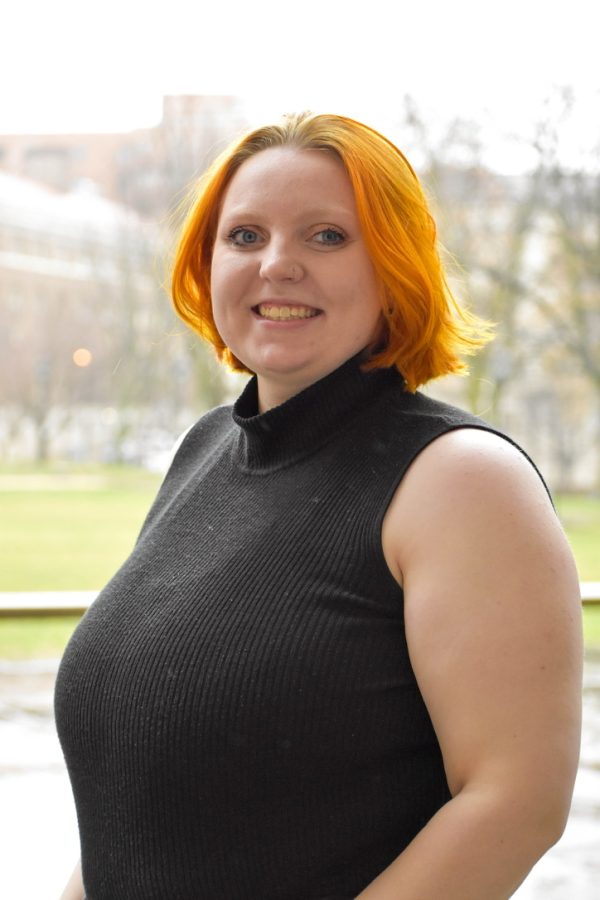Students with chronic illnesses find a sense of community through Chronic Connection
Image Courtesy of Beck Barrett
Beck Barrett, a junior political science major, is the president of Chronic Connection.
April 10, 2023
After being diagnosed with a chronic illness, Beck Barrett struggled to find a safe community. So, in fall 2021, they founded Chronic Connection, a club dedicated to helping students with chronic illnesses navigate college.
“I felt really isolated, obviously everyone was, but I was isolated by my health issues and I knew people were going through the same thing,” Barrett, a junior political science major, said. “I wanted to connect with people like me and wanted there to be a space to advocate for people like me.”
Chronic Connection helps students build relationships with peers who understand the lived experience of chronic health issues. Barrett, the club’s president, started Chronic Connection during their first-year at Pitt in the midst of the pandemic. The club meets on Thursdays to discuss available resources and give students a chance to “vent.”
“This is really just a place for people like us to just vent, rant, or talk about what’s going on and get advice,” Barrett said.
Angela Galiardo, the club’s communications director, said she was looking for emotional support when she joined two years ago.
“It’s hard to leave my house some days because of my health, so I was looking for friends to hang out with in different ways than the typical college scene,” Galiardo, a senior natural sciences major, said. “I only ever met one person who really knew how debilitating chronic illness was and that was isolating for me — I was hoping to find friends who understood that side of me.”
Galiardo said having a community and support system is important for anyone navigating college, but it’s especially necessary for those feeling isolated from chronic illness.
“It’s nice to know that when I have a day where I can’t get out of bed because my pain is so bad, there’s people who I can turn to and they understand,” Galiardo said. “Chronic illness can be isolating, but our president and founder of the club Beck has really created a wonderful community.”
Alexis McGannon, Chronic Connection’s current mental health liaison and next year’s communications director, said she joined the club in September because she wanted to be around people who faced similar obstacles.
“I really valued the idea of building a community of students managing a variety of health issues,” McGannon, a sophomore religious studies major, said.
As mental health liaison, McGannon helps students access various resources offered through the University and the city of Pittsburgh.
“I was drawn to the position of mental health liaison because I do think health and wellness should be understood holistically,” McGannon said. “The position offered me an opportunity to assist in that process while supporting my peers.”
The club also has collaborated with other mental health clubs and support groups on campus. Last week, they collaborated with Active Minds to talk about self-care and mental health. On Thursday at 6 p.m. in room 539 in the William Pitt Union, or on Zoom, the club plans to host an open meeting to educate the Pitt community on how they can better support students with chronic health issues.
Galiardo said she is looking forward to the event, and thinks it is important to continue educating the Pitt community on how to better support their fellow students with disabilities.
“The meeting is to learn about what life is like for a college student who isn’t able-bodied and how chronic illness can affect just daily basic things,” Galiardo said. “It’s really going to be an awesome and interactive and fun event.”
Barrett said this open meeting is an opportunity for students to better connect with the chronically ill community.
“This is really important because we are allowing the general public into our sacred space to hear our personal stories, asking them to learn from us, and listen to us,” Barrett said.
Barrett said some of the best help can come from the able-bodied community, if they just take some time and listen to their peers who deal with chronic conditions.
“You don’t have to be a medical doctor to have compassion. You just have to be able to listen to people,” Barrett said. “The number one thing you can do is listen and learn. Listen to them. Learn about illnesses.”








